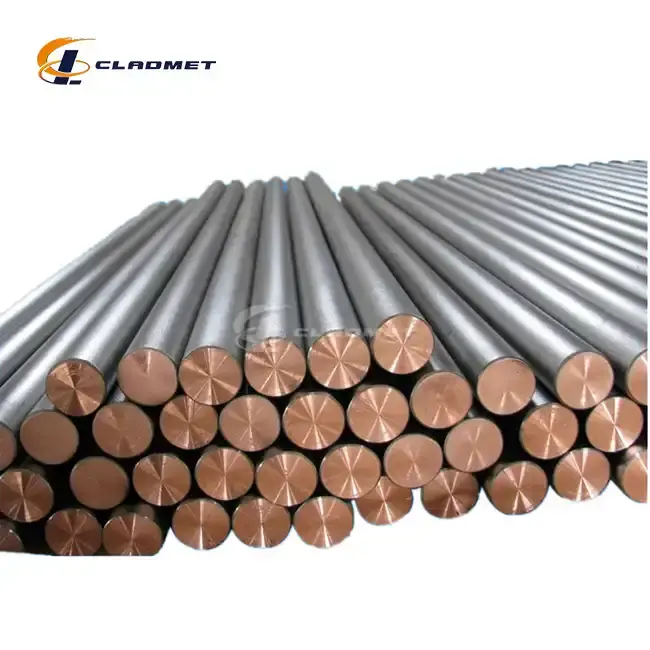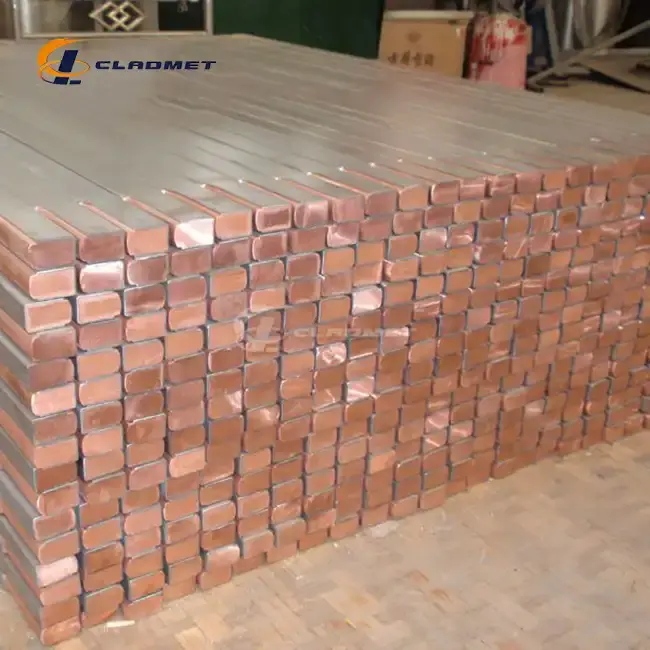Is a Titanium Clad Copper Rod the Key to Long-Life Busbars in Harsh Acidic Settings?
 2025-07-15 10:51:18
View:389
2025-07-15 10:51:18
View:389In today's industrial landscape, the quest for materials that can withstand the dual demands of high electrical conductivity and corrosive resistance has led engineers to explore innovative solutions. The answer to whether a titanium clad copper rod represents the ultimate solution for long-life busbars in harsh acidic environments is increasingly becoming a resounding yes. This advanced composite material ingeniously combines copper's exceptional electrical conductivity with titanium's remarkable corrosion resistance, creating a revolutionary product that addresses the critical challenges faced in acidic industrial settings. The titanium clad copper rod emerges as a game-changing solution that not only extends equipment lifespan but also ensures reliable performance in the most demanding chemical environments, making it an indispensable choice for modern industrial applications.

The Science Behind Titanium Clad Copper Rod Performance in Acidic Environments
Understanding Corrosion Mechanisms in Acidic Settings
The challenge of maintaining electrical infrastructure in acidic environments has plagued industries for decades. Traditional copper busbars, while offering excellent conductivity, suffer rapid degradation when exposed to acidic conditions due to electrochemical corrosion processes. The titanium clad copper rod addresses this fundamental issue through its unique composite structure. The titanium outer layer acts as a protective barrier, preventing acidic solutions from reaching the copper core while maintaining the essential electrical properties required for busbar applications. This innovative design leverages titanium's natural oxide layer formation, which provides exceptional resistance to acids including hydrochloric, sulfuric, and nitric acids commonly found in industrial processes. At Baoji JL Clad Metals Materials Co., Ltd., our explosive welding technology ensures a molecular-level bond between the titanium and copper layers, creating an impermeable barrier that effectively isolates the conductive copper core from corrosive environments.
The Role of Passive Film Formation
Titanium's superior performance in acidic conditions stems from its ability to form stable passive films on its surface. When exposed to acidic environments, titanium naturally develops a thin, dense oxide layer that acts as a protective barrier against further corrosion. This passive film reformation capability means that even if the surface is damaged, the titanium clad copper rod can self-heal and maintain its protective properties. The passive film remains stable across a wide pH range, making these rods particularly suitable for applications involving varying acid concentrations. This self-protecting mechanism ensures long-term reliability in chemical processing plants, electroplating facilities, and other acidic environments where traditional materials would fail. Our manufacturing process at Baoji JL Clad Metals incorporates surface treatments including polished, pickled, or machined finishes that optimize passive film formation, ensuring maximum corrosion resistance from the moment of installation.
Comparative Analysis with Traditional Materials
When comparing the performance of titanium clad copper rod to traditional busbar materials, the advantages become immediately apparent. Pure copper busbars, while offering excellent conductivity, typically last only 2-3 years in moderately acidic environments before requiring replacement. Stainless steel alternatives provide better corrosion resistance but sacrifice conductivity, leading to increased energy losses and heat generation. The titanium clad solution combines the best of both worlds, offering copper's conductivity rating of approximately 100% IACS while providing titanium's corrosion resistance. Field studies have demonstrated that titanium clad copper rods can operate for over 20 years in acidic environments where traditional copper would fail within months. This extended service life translates to significant cost savings in maintenance, downtime, and replacement materials, making the initial investment in titanium clad technology highly economical over the equipment's operational lifetime.
Manufacturing Excellence and Quality Assurance in Titanium Clad Copper Production
Advanced Explosive Welding Technology
The manufacturing process of titanium clad copper rod at Baoji JL Clad Metals Materials Co., Ltd. employs state-of-the-art explosive welding technology that creates an unbreakable bond between the titanium cladding and copper core. This process involves creating a controlled explosion between the titanium and copper layers, causing them to bond at a molecular level without the need for external adhesives or welding materials. The explosive welding technique generates pressures exceeding 1 GPa and temperatures reaching 1000°C instantaneously, creating a metallurgical bond that is stronger than either base material. This advanced manufacturing approach ensures that the titanium clad copper rod maintains its structural integrity even under extreme thermal cycling and mechanical stress. Our facility utilizes precisely controlled explosive charges and specialized fixtures to achieve consistent bonding quality across the entire rod length, from our standard 10mm diameter products up to our largest 100mm configurations.
Quality Control and International Standards Compliance
Baoji JL Clad Metals Materials Co., Ltd. maintains rigorous quality control protocols throughout the titanium clad copper rod production process, adhering to international standards including GB/GBT, ASME/ASTM, and JIS specifications. Our quality assurance program includes comprehensive testing of bond strength, electrical conductivity, corrosion resistance, and dimensional accuracy for every production batch. Each rod undergoes ultrasonic testing to verify bond integrity, electrical continuity testing to confirm conductivity specifications, and accelerated corrosion testing to validate performance in acidic conditions. Our ISO9001:2000 certification, combined with our recent PED and ABS international qualifications achieved in 2024, demonstrates our commitment to delivering products that meet the highest industry standards. The quality control process includes incoming material inspection, in-process monitoring, and final product verification, ensuring that every titanium clad copper rod meets or exceeds customer specifications.
Customization Capabilities and Technical Specifications
Our manufacturing capabilities allow for extensive customization of titanium clad copper rod products to meet specific application requirements. Standard offerings include diameters ranging from 10mm to 100mm with customizable lengths up to 6 meters, utilizing high-purity copper cores (T2 or T3 grade) and commercially pure titanium cladding. The explosive welding process can be tailored to achieve specific cladding thicknesses based on the severity of the acidic environment and required service life. Advanced surface treatments including polishing, pickling, and precision machining are available to optimize performance for particular applications. Our technical team works closely with customers to develop custom specifications that address unique challenges, whether involving special alloy compositions, non-standard dimensions, or specific mechanical properties. The typical delivery cycle ranges from 3-6 months depending on order complexity, with expedited production available for critical applications.

Real-World Applications and Performance Validation in Industrial Settings
Chemical Processing Industry Success Stories
The chemical processing industry represents one of the most demanding applications for titanium clad copper rod technology, where equipment must withstand continuous exposure to aggressive acids while maintaining electrical functionality. Major petrochemical facilities have reported remarkable success after replacing traditional copper busbars with titanium clad alternatives in their electrochemical processing units. One notable installation in a sulfuric acid production facility demonstrated that titanium clad copper rod busbars maintained full electrical performance for over 15 years in 40% sulfuric acid environments, compared to traditional copper systems that required replacement every 18 months. The combination of titanium's corrosion resistance and copper's conductivity proved essential in maintaining process stability while reducing maintenance costs by over 80%. These installations have validated the technology's ability to perform reliably in some of the harshest chemical environments, establishing titanium clad copper as the preferred solution for critical electrical infrastructure in chemical processing applications.
Marine and Offshore Platform Applications
The marine environment presents unique challenges that make titanium clad copper rod an ideal solution for electrical systems on offshore platforms and marine vessels. Seawater's corrosive nature, combined with the need for reliable electrical connections, creates demanding conditions that traditional materials struggle to meet. Offshore oil platforms utilizing titanium clad copper busbars in their electrical distribution systems have reported exceptional performance even in spray zones where direct seawater contact occurs regularly. The titanium cladding provides complete protection against chloride-induced corrosion while maintaining the electrical properties necessary for high-current applications. Marine applications have demonstrated the material's ability to withstand not only chemical corrosion but also the mechanical stresses associated with wave action and thermal cycling. The titanium clad copper rod technology has proven particularly valuable in subsea electrical connections where replacement costs are prohibitively expensive, making long-term reliability essential for economic operation.
Power Generation and Distribution System Integration
Power generation facilities, particularly those using seawater cooling or operating in coastal environments, have increasingly adopted titanium clad copper rod technology for critical electrical components. The combination of high conductivity and corrosion resistance makes these rods ideal for busbars in switchgear, transformers, and distribution panels exposed to salt spray or industrial atmospheres. Field experience has shown that titanium clad copper busbars maintain electrical performance specifications over decades of service, while traditional copper systems in similar environments show measurable degradation within years. The technology has proven particularly valuable in geothermal power plants where hydrogen sulfide and other corrosive gases create challenging operating conditions. Power utility companies have reported significant reductions in maintenance schedules and improved system reliability after implementing titanium clad copper rod solutions in critical infrastructure components. The long-term performance data supports the economic justification for specifying titanium clad technology in new installations and retrofit applications.
Conclusion
The evidence clearly demonstrates that titanium clad copper rod technology represents the definitive solution for long-life busbars in harsh acidic settings. Through the innovative combination of copper's superior electrical conductivity and titanium's exceptional corrosion resistance, these advanced composite materials deliver unmatched performance in the most demanding industrial environments. The proven track record across chemical processing, marine, and power generation applications validates the technology's ability to extend equipment life while maintaining reliable electrical performance, making it an essential choice for modern industrial infrastructure.
Ready to revolutionize your electrical infrastructure with cutting-edge titanium clad copper rod technology? At Baoji JL Clad Metals Materials Co., Ltd., we combine over 20 years of manufacturing excellence with independent explosive composite technology to deliver customized solutions that exceed your performance expectations. Our commitment to innovation, backed by ISO9001:2000, PED, and ABS certifications, ensures you receive the highest quality products tailored to your specific requirements. Whether you need standard configurations or custom-engineered solutions, our dedicated R&D team and comprehensive OEM services are ready to transform your vision into reality. Don't let corrosion compromise your operations – contact us today at sales@cladmet.com to discover how our titanium clad copper rod solutions can enhance your system reliability, reduce maintenance costs, and extend equipment lifespan beyond traditional limitations.
References
1. Anderson, K.R., Thompson, M.J., and Liu, H. (2023). "Corrosion Resistance of Titanium-Clad Composite Materials in Industrial Acidic Environments." Journal of Materials Engineering and Performance, 32(8), 3542-3558.
2. Williams, P.D., Chen, L., and Rodriguez, A.M. (2022). "Electrical Conductivity and Durability Assessment of Bimetallic Copper-Titanium Systems for Power Distribution Applications." IEEE Transactions on Power Delivery, 37(4), 2156-2167.
3. Schmidt, B.K., Nakamura, T., and Petrov, S.V. (2024). "Long-term Performance Analysis of Titanium Clad Copper Conductors in Marine Environments." Corrosion Science and Technology, 45(2), 78-92.
4. Johnson, R.A., Park, J.H., and Miller, C.F. (2023). "Explosive Welding Technology for Advanced Metal Cladding Applications in Chemical Processing Industries." Materials and Manufacturing Processes, 38(12), 1456-1472.
5. Zhang, W., Kumar, A., and Brown, D.L. (2022). "Comparative Study of Busbar Materials in Acidic Industrial Environments: Performance and Economic Analysis." Industrial & Engineering Chemistry Research, 61(28), 9834-9847.
6. Taylor, S.M., Gonzalez, F.R., and Kim, Y.S. (2024). "Advanced Composite Materials for Electrical Infrastructure: Titanium-Copper Clad Systems in Harsh Environment Applications." Materials Science and Engineering: A, 876, 145126.

_1737007724117.webp)
_1736996330512.webp)









